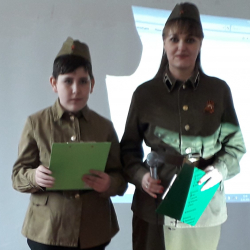Оргмомент | Good morning pupils! I’m glad to see you! Wake, body, wake, mind! Work, play, seek, find! Let’s go! So, tell me please what date is it today? What day is it today? Who is absent today? What was the topic of our previous lesson? What poem about language did we learn?
| Good morning teachers! We are glad to see you too!
Today is the 5th of December
Today is Monday. … are absent today. Studying of Russian language.
The poem about the foreign girl. |
Фонетическая разминка | Let’s remember our poem. We have learnt it this week. Listen to me and repeat the sentences after me. Let's recite the poem all together. Who wants to recite the poem to our class? Учитель предлагает учащимся вспомнить стихотворение, разученное на предыдущем уроке. Сначала дети декламируют стихотворение за учителем хором, а потом по одному. Well done! | -I met a girl who came from another land. I couldn't speak her language, But I took her by the hand. We danced together, had such fun, Dancing is the language You can speak with everyone. |
| 3. Проверка домашнего задания | - It's time to check your hometask. You will read the sentences form exercise 24, page 58 in English and in Russian one by one. I am sure you can translate the sentences from Russian into English well. Let's read and translate the sentences from exercise 3, page 40 from your Workbooks. We shall work in a chain. If you answer the question, you will be able to ask the next one. Who will be the first? Учитель предлагает ученикам проверить письменное домашнее задание - упр. 24, стр. 58 из учебника. Учащиеся зачитывают и переводят по одному предложению из данного упражнения. По окончании проверки учитель хвалит детей! Good for you! | -There are a lot of English-speaking countries. In what countries do people speak English? -…….
|
| 4. Переход к новой теме. | Now look at our new topic at the blackboard. Do you guess what we will do this lesson? Yes, it is so. But we will not only read the poem, but also imagine the view of the description, do the creative translation of this poem. Do you think it is really interesting? Учитель отходит от работы с учебником на этом уроке, заменяя его презентацией и раздаточным материалом. |
-Doing our creative translation is interesting for me! -What poem are we going to read? |
| 5.Работа на уроке. (ответы на вопросы и выполнение упражнений) | I won’t tell yiu what poem it is. Let’s guess. Look at the window. What can you see.
What else can you say? What season and what time of the day is it now? Connect this two words together and guess the title of the poem. Yes, you are right. Who wrote this poem? Well done! Look at the slide. What do you know about this famous poet? What poems have you learnt by heart? Do you know his fairy tales. Can you name some of them?
Well, now we are going to listen to this poem. Учитель включает запись. Ex.65 p. 49. Затем учитель выдает раздаточный материал с текстом стихотворения. Now I’ll give you the shirts with the poem it's your turn to read the poem and its translation. Work in pairs and listen to each other. Ex.66 p.49 I hope you enjoy your English reading this poem. As you see, the author of the poem and the translator use a lot of adjectives U) describe the Russian winter. Will you find them? Can you odd other adjectives to describe the winter (summer, autumn, spring) in Russia?
| I can see winter scenery. I can see snow everywhere. I can see the trees, the pavement, the road, the roofs covered with snow.
Pupils read the poems to each other.
-lovely, mellow, gaily crackling, lightly, gleaming brightly, empty fields, empty meadows, long dear.
Summer – hot, dry, sunny, Autumn – orange, yellow, cold, rainy…
|
| Продолжение работы на уроке. | Затем учитель выбирает 2-3х учеников, чтобы те зачитали стих выразительно и продекламировали свой творческий перевод. I thank you for your work. We are short of time and our lesson is over.
| Ученики зачитывают свой перевод и читают стих выразительно. (для экономии времени можно поделить стих на столбики |

















